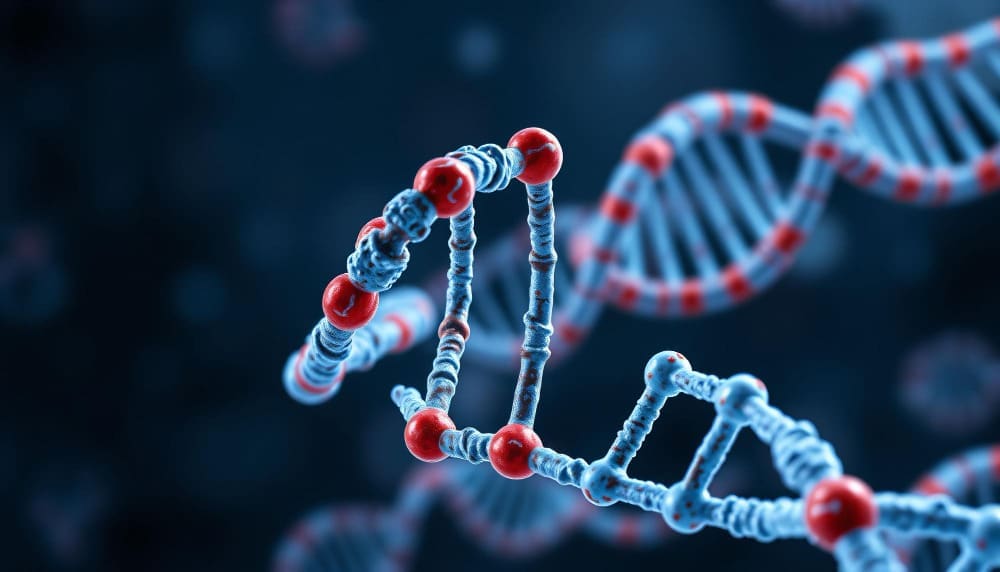Last Updated on November 26, 2025 by Bilal Hasdemir

At Liv Hospital, we know that autoimmune diseases often have a genetic link. Many conditions tend to run in families. Recent studies show that our genes and immune system interact in complex ways.
Understanding the genetic basis of these diseases is key to developing targeted therapies. We look into how genetic links in autoimmune diseases are changing diagnosis and personalized medicine.
Key Takeaways
- Autoimmune conditions are often linked to genetic factors.
- Polygenic inheritance plays a significant role in most autoimmune diseases.
- Understanding genetic links can lead to more targeted treatment approaches.
- Personalized medicine is becoming increasingly important in autoimmune disease treatment.
- Genetic research is improving our understanding of autoimmune diseases.
The Genetic Foundations of Autoimmune Conditions
Understanding the genetic roots of autoimmune conditions is key. These diseases come from a mix of genetic predisposition and environmental factors. This mix leads to the body’s immune system attacking its own tissues.
Polygenic Nature: Beyond Single-Gene Causes
Autoimmune diseases aren’t caused by one gene. Instead, they are polygenic, meaning many genes work together to increase disease risk. Research has found many genetic markers linked to these diseases, showing their complex genetic makeup.
Studies show that autoimmune diseases often run in families. This suggests a strong genetic link. For example, people with a family history of these diseases are more likely to get them too.
The Complex Interplay Between Genes and Environment
The start of autoimmune diseases is a mix of genetics and environment. Genetics sets the stage, but things like infections, stress, or chemicals can spark the disease.
| Genetic Factor | Environmental Trigger | Disease Outcome |
|---|---|---|
| HLA genetic locus | Infections | Rheumatoid Arthritis |
| Multiple contributing genes | Stress, Chemicals | Lupus, Multiple Sclerosis |
Knowing how genetics and environment play into autoimmune diseases is vital. It helps us create better treatments. By pinpointing genetic markers and understanding their interaction with environmental factors, we can tailor treatments to each person.
Are Autoimmune Diseases Genetic? Understanding Heredity Patterns
Autoimmune diseases often run in families, leading to questions about their genetic roots. We look into the evidence that shows a genetic link, like family patterns and twin studies.
Family Clustering Evidence
Autoimmune diseases seem to follow a family trend, hinting at a genetic connection. If a family member has an autoimmune disease, you’re more likely to get it too. This pattern is seen in diseases like rheumatoid arthritis, lupus, and multiple sclerosis.
Twin Studies and Concordance Rates
Twin studies have shed light on the genetic side of autoimmune diseases. They show a 25-50% chance of getting an autoimmune disease if your twin has it. This highlights the role of genes in these conditions.
These studies show that genes and environment both play parts in autoimmune diseases. Knowing about heredity helps us find at-risk people and create better treatments.
Key Genetic Markers in Autoimmune Disease Development
Autoimmune diseases have a complex genetic basis. Genes and environmental factors work together. Research has found key genetic markers linked to these diseases.
The Human Leukocyte Antigen (HLA) genetic locus is a major player. It codes for proteins that regulate the immune system.
The Critical Role of the HLA Genetic Locus
The HLA locus is strongly linked to autoimmune diseases. Certain alleles in this region are associated with type 1 diabetes, rheumatoid arthritis, and lupus. For example, the HLA-DRB1 gene is linked to rheumatoid arthritis.
“The HLA region on chromosome 6 is the most prominent genetic risk factor for many autoimmune diseases, highlighting the central role of immune regulation in disease pathogenesis.”
The HLA locus is complex, with many genes and alleles involved. Knowing which HLA alleles are involved helps us understand autoimmune diseases better.
The Network of 50+ Contributing Genes
Research has found over 50 genes that contribute to autoimmune disease risk. These genes are involved in immune processes like T-cell activation and cytokine signaling.
| Gene | Associated Autoimmune Disease | Function |
|---|---|---|
| HLA-DRB1 | Rheumatoid Arthritis | Antigen presentation |
| CTLA4 | Type 1 Diabetes, Rheumatoid Arthritis | T-cell regulation |
| PTPN22 | Rheumatoid Arthritis, Lupus | T-cell signaling |
These genetic markers help us understand autoimmune diseases. They also guide diagnosis and treatment. Identifying high-risk individuals can help prevent or delay disease onset.
As we learn more about autoimmune diseases, the picture gets more complex. The interaction between genes and environment is challenging. Yet, this knowledge opens doors for personalized medicine and targeted therapies.
Is Autoimmune Disease Hereditary? The Inheritance Question
Autoimmune diseases often appear in families, making us wonder if they are inherited. Scientists are studying the genes behind these diseases. They want to know how family history affects their development.
Having a family history of these diseases raises your risk. But, having a certain gene doesn’t mean you’ll definitely get the disease. We’ll look into how genes and family history work together.
Predisposition vs. Guaranteed Development
It’s important to understand the difference between genetic predisposition and actual disease development. A predisposition means you’re more likely to get the disease because of your genes. But, it’s not a sure thing. Other factors like environment and lifestyle also matter.
Key factors influencing the development of autoimmune diseases include:
- Genetic susceptibility
- Environmental triggers
- Lifestyle factors
Calculating Family Risk Factors
To figure out family risk, we look at the history of autoimmune diseases in a family. This helps us see who might be at higher risk. We combine family history with genetic tests to estimate risk.
| Family History | Risk Level |
|---|---|
| No first-degree relatives with autoimmune disease | Low |
| One first-degree relative with autoimmune disease | Moderate |
| More than one first-degree relative with autoimmune disease | High |
By understanding the hereditary side of autoimmune diseases, we can spot who’s at risk. This helps us prevent or delay these diseases with early action and lifestyle changes.
Why Do People Get Autoimmune Diseases?
Autoimmune diseases come from a mix of genes and the environment. This mix starts the disease. We now see these conditions as a complex mix of many factors.
The “Perfect Storm” Theory
The “perfect storm” theory says autoimmune diseases happen when genes and the environment meet. Genetic predisposition is the first step. Then, things like infections or chemicals can start the disease.
- Genetic Factors: Many genes increase the risk of autoimmune diseases.
- Environmental Triggers: Certain viruses or chemicals can start an autoimmune response in those at risk.
Environmental Triggers and Genetic Susceptibility
Studies show that environmental triggers are key in autoimmune diseases. For example, a study on multiple sclerosis found that estradiol and estriol might protect nerve function. This was reported on News-Medical.net.
“The complex interplay between genetic predisposition and environmental factors is key to understanding why people develop autoimmune diseases.”
Understanding autoimmune diseases is vital for better treatments. By knowing the role of genes and the environment, we can move towards personalized medicine. This means treatments that fit each patient’s needs.
Are You Born With Autoimmune Diseases?
For years, researchers and patients have wondered if we’re born with autoimmune diseases. Now, we know that our genes play a big role in these conditions.
Studies show that some people might be born with a higher risk of getting autoimmune diseases. But, having these genes doesn’t mean they will definitely get sick. It’s how our genes and environment work together that decides if we get sick.
Genetic Predisposition from Birth
Research has found that some genetic changes are present at birth. These changes can make us more likely to get certain diseases. For example, changes in the HLA gene can raise the risk of rheumatoid arthritis and type 1 diabetes.
Having a genetic risk doesn’t mean you will definitely get sick. It just means you might be more likely to. Many things, like what we’re exposed to and how we live, can affect this risk.
The Timeline of Disease Manifestation
When autoimmune diseases show up can vary a lot. Some people might start showing symptoms early, while others might not show any signs until much later.
Things like infections or chemicals can trigger the start of symptoms in people who are already at risk. Knowing what triggers these diseases and how they work with our genes is important. It helps us try to prevent or delay when symptoms start.
By understanding the genetic risk for autoimmune diseases and how they develop, we can start treating them earlier. This can lead to better management and care for those affected.
Common Patologías Autoinmunes and Their Genetic Profiles
Understanding the genetic profiles of autoimmune diseases is key for better treatments and patient care. Autoimmune diseases happen when the body’s immune system attacks itself. Many genes are involved in this process.
Rheumatoid Arthritis Genetic Markers
Rheumatoid arthritis (RA) is a chronic condition that mainly affects the joints. Research has found several genetic markers linked to RA. The HLA-DRB1 gene is a major risk factor, with certain alleles being more significant.
Other genes, like PTPN22 and STAT4, also increase the risk of getting RA.
Lupus Genetic Associations
Systemic lupus erythematosus (SLE) is a complex autoimmune disease that can affect many parts of the body. Studies have found several genes linked to SLE risk. The HLA region, including HLA-DRB1 and HLA-DQB1, is strongly associated with SLE.
Multiple Sclerosis Genetic Risk Factors
Multiple sclerosis (MS) is a disease that affects the central nervous system. Research has identified several genetic risk factors for MS. The HLA-DRB1*15:01 allele is a major risk factor, mainly in people of European descent.
Other genes, such as IL2RA and IL7R, also increase the risk of MS.
Type 1 Diabetes Genetic Patterns
Type 1 diabetes (T1D) is an autoimmune disease that destroys insulin-producing cells in the pancreas. The genetics of T1D involve many risk loci. The HLA region, including HLA-DRB1, HLA-DQA1, and HLA-DQB1, is a key player in T1D.
Non-HLA genes, such as INS, CTLA4, and PTPN22, also contribute to T1D risk.
| Disease | Key Genetic Markers | Associated Genes |
|---|---|---|
| Rheumatoid Arthritis | HLA-DRB1 | PTPN22, STAT4 |
| Lupus | HLA-DRB1, HLA-DQB1 | IRF5, STAT4, BLK |
| Multiple Sclerosis | HLA-DRB1*15:01 | IL2RA, IL7R |
| Type 1 Diabetes | HLA-DRB1, HLA-DQA1, HLA-DQB1 | INS, CTLA4, PTPN22 |
These genetic profiles help us understand autoimmune diseases better. They also lead to personalized medicine. By identifying specific genetic markers, doctors can tailor treatments for each patient. This could improve outcomes.
Maternal vs. Paternal Inheritance in Autoimmune Conditions
Autoimmune diseases are complex and influenced by genetics and environment. Research shows that genetic factors from parents can affect the risk of certain diseases. This is true for both maternal and paternal inheritance.
Sex-Biased Inheritance Patterns
Some diseases are more likely to come from one parent than the other. This is called sex-biased inheritance. For autoimmune diseases, this pattern is significant. For example, some studies find that certain diseases are more common in females, possibly due to genetic inheritance.
Autoimmune diseases often affect females more, which might be due to sex-biased inheritance. Scientists are studying how genetics and hormones interact to affect disease risk.
| Autoimmune Disease | Prevalence in Females | Potential Genetic Influence |
|---|---|---|
| Rheumatoid Arthritis | Higher | Linked to HLA genetic locus |
| Lupus | Higher | Influenced by X-chromosome factors |
| Type 1 Diabetes | Similar to males | Multiple genetic factors |
X-Chromosome Inactivation and Autoimmunity
The X chromosome is key to the immune system. Its inactivation can affect disease risk. X-chromosome inactivation is when one X chromosome is turned off in females. This can sometimes lead to autoimmune responses.
For more on autoimmune diseases and genetics, check out the Primary Immune Deficiency website. It offers insights into genetic factors in immune conditions.
In conclusion, studying maternal vs. paternal inheritance in autoimmune diseases is complex. It involves understanding sex-biased inheritance patterns and X-chromosome inactivation. This knowledge is key to understanding the genetic basis of these diseases.
Auto Immune Disease Syndrome: Multiple Conditions in One Patient
Autoimmune diseases can be complex, sometimes causing more than one condition in a person. This is known as Auto Immune Disease Syndrome. It makes diagnosis, treatment, and care harder.
Patients with this syndrome often have conditions like rheumatoid arthritis, lupus, and type 1 diabetes. This shows that there might be common causes, possibly linked to genes.
Shared Genetic Pathways Between Different Conditions
Studies have found that different autoimmune diseases can share genetic links. For example, some genes increase the risk of rheumatoid arthritis, while others do the same for type 1 diabetes.
This shared genetics can explain why some people get more than one autoimmune disease. A study in a medical journal said, “Autoimmune diseases have a complex genetic makeup, involving many genes and environmental factors.”
“The genetic predisposition to autoimmune diseases is a critical factor in the development of multiple conditions in a single patient,” as noted by experts in the field.
| Autoimmune Disease | Associated Genetic Markers |
|---|---|
| Rheumatoid Arthritis | HLA-DRB1, PTPN22 |
| Type 1 Diabetes | HLA-DQB1, INS |
| Lupus | HLA-DRB1, IRF5 |
Management Challenges of Multiple Autoimmune Syndromes
Managing patients with Auto Immune Disease Syndrome is tough. Treatment plans must handle all diseases at once, needing a team effort.
A good treatment plan includes medicine, lifestyle changes, and regular check-ups. Personalized medicine is key, tailoring treatments to each patient’s needs.
In conclusion, Auto Immune Disease Syndrome is a big challenge. Knowing the genetic links between diseases helps in finding better treatments. A holistic approach to care can lead to better results for those with multiple autoimmune diseases.
Genetic Testing and Risk Assessment
Genetic testing is key for understanding autoimmune conditions. It helps identify who might be at risk. But, it’s important to know how to read these results.
Current Testing Capabilities
Genetic testing has come a long way. It can spot specific genes linked to autoimmune diseases. Today, we can:
- Find HLA alleles linked to autoimmune conditions
- Spot non-HLA genes that increase disease risk
- Do whole-genome sequencing for a detailed look
These tests help doctors see if you might get an autoimmune disease. But, remember, having a genetic risk doesn’t mean you’ll definitely get the disease.
Interpreting Results and Risk Stratification
Understanding genetic test results for autoimmune disease risk is complex. Risk stratification means figuring out how likely you are to get the disease based on your genes and other factors.
A study in a top medical journal showed the value of combining genetic risk with environmental factors. It found that people with a high genetic risk were more likely to get autoimmune diseases if they were exposed to certain environmental triggers.
“The use of genetic testing in healthcare could change how we manage autoimmune diseases. It could lead to early help for those at risk.”
Expert Opinion on Genetic Testing
To show how risk stratification works, here’s a table with hypothetical genetic risk scores and disease likelihood:
| Genetic Risk Score | Disease Likelihood |
|---|---|
| Low (0-0.3) | Minimal risk |
| Moderate (0.4-0.6) | Elevated risk; monitoring recommended |
| High (0.7-1.0) | Significant risk; preventive measures considered |
Knowing your genetic risk helps doctors plan the best way to prevent autoimmune diseases. They can create a plan just for you.
Autoimmune Disease Treatment: How Genetics Informs Therapeutic Approaches
Understanding the genetic roots of autoimmune diseases is key to better treatments. As we learn more about the link between genes and these conditions, we’re moving towards more tailored treatments.
Personalized Medicine Based on Genetic Profiles
Personalized medicine is changing how we treat autoimmune diseases. By looking at a patient’s genetic profile, we can find specific markers linked to their condition. This lets us create treatment plans that fit each person’s unique genetic makeup.
Genetic profiling helps us guess how a patient will react to certain drugs. This means we can pick the best treatment right from the start. It improves patient results and makes treatment smoother, cutting down on trial-and-error.
Targeted Biologics and Gene-Specific Therapies
The growth of targeted biologics and gene-specific therapies is also influenced by genetics. Knowing the genetic factors behind a patient’s condition lets us choose therapies that target those specific areas. This can lead to better disease control with fewer side effects.
For example, some biologics aim at proteins involved in inflammation, common in autoimmune diseases. By finding the genetic changes affecting these proteins, we can guess which patients will benefit most from these treatments.
Pharmacogenomics in Autoimmune Treatment
Pharmacogenomics, studying how genes affect drug responses, is key in treating autoimmune diseases. By looking at a patient’s genetic data, we can forecast how they’ll react to certain drugs, including side effects. This helps us choose the right drugs and the right doses, making treatments more effective and safer.
Using pharmacogenomics in practice is helping us give personalized care to patients with autoimmune diseases. As we learn more about how genes influence drug responses, we can tailor treatments to meet each patient’s needs better.
Conclusion: The Future of Genetics in Autoimmune Disease Management
Genetics are key in managing autoimmune diseases. The mix of genes and environment triggers these conditions. Knowing the genetic roots helps us find better treatments.
The future is in using genetics in treatment plans. We’re moving towards personalized medicine. This means treatments fit each person’s genetic profile, leading to better health and life quality.
Research in genetics and autoimmune diseases is growing fast. We’re finding new genetic markers and disease pathways. This knowledge opens doors to new treatments like targeted biologics and gene therapies. By focusing on genetics, we can change how we handle these diseases.
FAQ
Are autoimmune diseases genetic?
Autoimmune diseases are complex. They involve genetics and environment. While there’s no single “autoimmune gene,” many genes increase the risk.
Is autoimmune disease hereditary?
Family history can raise your risk. But it doesn’t mean you’ll definitely get it. We make a clear difference between genetic risk and guaranteed disease.
What is the role of the HLA genetic locus in autoimmune disease?
The HLA locus is key in autoimmune diseases. It’s a genetic marker that increases the risk of conditions like rheumatoid arthritis and lupus.
Can genetic testing predict the risk of autoimmune disease?
Genetic tests can find markers linked to higher risk. But, results must be seen in context. Family history and environmental factors matter too.
Why do people develop autoimmune diseases?
The “perfect storm” theory says it’s genetics and environment together. This combo leads to autoimmune diseases.
Are you born with autoimmune diseases?
You’re born with genetic predisposition. But, the disease may not show up until later. Various triggers can set it off.
What are some common autoimmune diseases and their genetic profiles?
Diseases like rheumatoid arthritis, lupus, multiple sclerosis, and type 1 diabetes have unique genetic markers. Knowing these can help in treatment.
Is there a difference between maternal and paternal inheritance in autoimmune conditions?
Yes, research shows sex-biased inheritance. X-chromosome inactivation also affects autoimmunity.
Can someone have multiple autoimmune diseases?
Yes, some people have multiple autoimmune diseases. This is called autoimmune disease syndrome. It’s hard to manage because different diseases share genetic pathways.
How does genetic information inform therapeutic approaches for autoimmune diseases?
Genetic info helps in creating personalized medicine. It leads to targeted treatments and better outcomes.
What is the future of genetics in autoimmune disease management?
Using genetics in treatment could greatly improve care for autoimmune disease patients.
Are autoimmune diseases genetic?
Autoimmune diseases are complex. They involve genetics and environment. While there’s no single “autoimmune gene,” many genes increase the risk.
Is autoimmune disease hereditary?
Family history can raise your risk. But it doesn’t mean you’ll definitely get it. We make a clear difference between genetic risk and guaranteed disease.
What is the role of the HLA genetic locus in autoimmune disease?
The HLA locus is key in autoimmune diseases. It’s a genetic marker that increases the risk of conditions like rheumatoid arthritis and lupus.
Can genetic testing predict the risk of autoimmune disease?
Genetic tests can find markers linked to higher risk. But, results must be seen in context. Family history and environmental factors matter too.
Why do people develop autoimmune diseases?
The “perfect storm” theory says it’s genetics and environment together. This combo leads to autoimmune diseases.
Are you born with autoimmune diseases?
You’re born with genetic predisposition. But, the disease may not show up until later. Various triggers can set it off.
What are some common autoimmune diseases and their genetic profiles?
Diseases like rheumatoid arthritis, lupus, multiple sclerosis, and type 1 diabetes have unique genetic markers. Knowing these can help in treatment.
Is there a difference between maternal and paternal inheritance in autoimmune conditions?
Yes, research shows sex-biased inheritance. X-chromosome inactivation also affects autoimmunity.
Can someone have multiple autoimmune diseases?
Yes, some people have multiple autoimmune diseases. This is called autoimmune disease syndrome. It’s hard to manage because different diseases share genetic pathways.
How does genetic information inform therapeutic approaches for autoimmune diseases?
Genetic info helps in creating personalized medicine. It leads to targeted treatments and better outcomes.
What is the future of genetics in autoimmune disease management?
Using genetics in treatment could greatly improve care for autoimmune disease patients.
References
GoodRx. Are Autoimmune Diseases Genetic? https://www.goodrx.com/health-topic/autoimmune/genetic-causes
Science. Potassium-Chloride Co-Transporter Gene, KCC2, Implicated In EIMFS, A Childhood Epileptic Syndrome. https://www.science.org/doi/10.1126/science.adg2992








